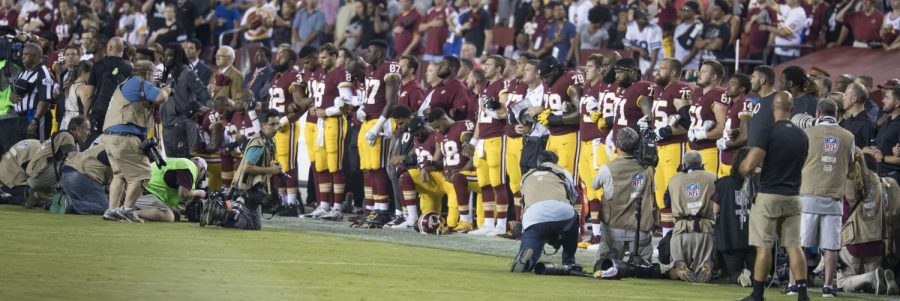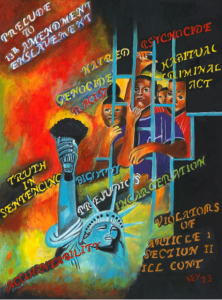Celebrities remaining silent is cowardly
To protest police brutality and racism, some Washington Redskins teammates kneel during the national anthem before playing against the Oakland Raiders on Sept. 24.
October 17, 2017
Politics are a part of complicated and heated debates lately. It seems like every week President Donald Trump goes on a Twitter rampage. Recently his attention is directed to the National Football League players who choose to protest police brutality and racism by kneeling during the national anthem.
Reviving his famous tagline from his days on “The Apprentice,” President Trump said, “Wouldn’t you love to see one of these NFL owners, when somebody disrespects our flag, to say: ‘Get that son of a bitch off the field right now. Out! He’s fired!’” to a crowd in Alabama on Sept. 22.
This comment relayed the president’s feelings about not standing during the national anthem as disrespectful.
While some argue that using their media outreach as a platform is not correct and they should just stick to doing their job, I argue that having access to a media platform and not using it is irresponsible and cowardly.
This became an issue back in 2016 when then quarterback for the San Francisco 49ers, Colin Kaepernick, protested the killings of African-American men by the police by kneeling during the national anthem.
“I am not going to stand up to show pride in a flag for a country that oppresses black people and people of color,” Kaepernick said. “To me, this is bigger than football and it would be selfish on my part to look the other way. There are bodies in the street, and people getting paid leave and getting away with murder.”
While Kaepernick received a lot of backlash for his actions, it was the recent comments made by Trump that escalated the issue and brought the topic back into the national spotlight.
On Sept. 24, many players protested the comments made by the president by kneeling, linking arms, or refusing to go on the field during the playing of the national anthem.
As both outrage and support poured in about his comment and the actions of the football players, the following question came into consideration: should celebrities, or people in high profiled jobs, be able to use their place as a platform to discuss politics?
This question was asked before and some public figures already suffered the consequences of voicing their opinions.
Days before the bombing in Iraq began in 2003, lead singer for the highly successful country trio, the Dixie Chicks, Natalie Maines commented during a concert in London that, “We do not want this war, this violence, and we’re ashamed that the President of the United States is from Texas.”
With an audience of mostly conservative listeners, country music radio stations responded by pulling the trio’s music from the airs, fans trashed their CDs, and their careers have never fully recuperated.
While many know the reason behind the actions that led Kaepernick to take a knee as a way of protesting police brutality towards African-Americans, most are quick to forget that the quarterback remains unsigned. There have been speculations on whether his current state of unemployment is due to his performance on the field or because of his political statements, but no real answer is found.
This time around, football players were not the only ones met with backlash for taking a knee during the anthem.
After performing the Star Spangle Banner, country singer Meghan Linsey took a knee in the middle of the field, showcasing her support for the movement started by Kaepernick.
Linsey stated, “I love the American Flag, but a symbol is nothing without the people it represents. So yesterday, I kneeled for those who are mistreated, beaten down and disregarded.”
It wasn’t long before criticism of her actions came pouring in, thanks to social media sites such as Twitter. Comments calling her “disrespectful,” “un-American,” and saying that her career is over were heard from across the country.
While some celebrities and public figures use their access to outlets as a social platform for issues they are passionate about, others believe that it is not their place to state their political opinions.
Actor Mark Wahlberg is among those celebrities who argues that letting the public know of their personal opinions does not offer any benefits. “They might buy your CD or watch your movie, but you don’t put food on their table. You don’t pay their bills,” he said.
Just like Linsey and Wahlberg hold different opinions, people are also torn on the subject.
To me, the idea of someone having the ability to reach millions of people and using it as a platform is a gray area.
To say that I will always support my favorite musician, no matter what they said or did, is a lie.
It would depend on the message behind the action.
If they are preaching about their strong pro-life views, I would continue to buy their music and attend their concerts, even though I am pro-choice. However, if an artist is agreeing with the deportation of thousands of immigrants, an issue that as a first-generation American I hold near and dear to my heart, I will no longer support them.
Regardless of what side you’re on, that is the beauty of the United States: we have a choice.
Celebrities are free to publicize their opinions and we are free to respond to them. If you don’t like someone’s opinion you are able to disregard it or decide to no longer associated with them.
Very few people in the world have the power or ability to reach a widespread audience. This ability can be life-changing and powerful if done correctly. But while they have the power to speak up about an issue, we have the power to choose to listen.
For every fan that decided to stop supporting a public figure for their opinions and comments, there are other fans that also endorse those same opinions. They are free to decide what to say and we are free to decide to support them or not.
In situations like the one created by the comments of a president, it is important to understand that not all of us hold the same beliefs. With communication from both sides, as uncomfortable as they might be, we are able to learn from each other and create some sort of change.
So stand up, or kneel, for your beliefs and let your voice be heard.







